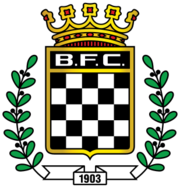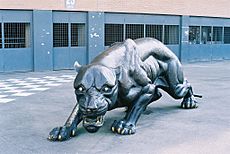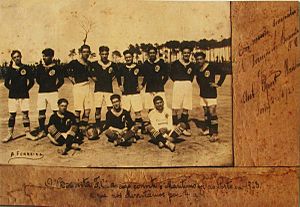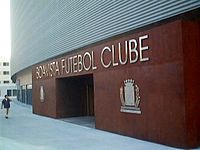Boavista F.C. facts for kids
 |
|||
| Full name | Boavista Futebol Clube | ||
|---|---|---|---|
| Nickname(s) | Os Axadrezados (The Chequered ones) Boavisteiros As Panteras (The Panthers) Os pretos e brancos (The black and whites) |
||
| Founded | 1 August 1903 | ||
| Ground | Estádio do Bessa | ||
| Capacity | 28,263 | ||
| Owner | Gérard López | ||
| President | Rui Garrido Pereira | ||
| Head coach | Stuart Baxter | ||
| League | Porto Football Association | ||
| 2024–25 | Primeira Liga, 18th of 18 (administratively relegated) | ||
|
|
|||
Boavista Futebol Clube, often called Boavista, is a professional sports club from the Boavista area of Porto, Portugal. This club is famous for its football team, which plays at the Estádio do Bessa. It is one of Portugal's oldest clubs, started on August 1, 1903, by British business people and Portuguese textile workers.
Boavista became a very important sports club in Portugal. It has teams for many sports, including football, chess, gymnastics, bicycle racing, futsal, volleyball, rink hockey, and boxing. The football team is especially well-known for its unique black and white chequered shirts.
Boavista has won 9 major trophies in Portugal. These include 1 Championship, 5 Portuguese Cups, and 3 domestic Super Cups. This makes them the most successful Portuguese football club after the "Big Three" clubs: Benfica, Porto, and Sporting CP. Boavista played in the top league, the Primeira Liga, for 39 years in a row. They are one of only two teams outside the "Big Three" to have won the Portuguese Championship, which they did in the 2000–01 season. Boavista has a big rivalry with their city neighbors, Porto. Matches between these two teams are sometimes called the Invicta derby.
Their home stadium, Estádio do Bessa, was built in 1973. However, football had been played on that spot since the 1910s. The stadium was updated for the Euro 2004 football tournament.
Contents
Club History
How Boavista Started (1903–1933)
The club began on August 1, 1903, in the Boavista area of Porto. Two English brothers, Harry and Dick Lowe, started it. They had received a football from their father in England. They first named the club The Boavista Footballers. An early rival was another English club in the city, the Oporto Cricket and Lawn Tennis Club.
At first, there was a disagreement because the British players, who were Anglican, did not want to play on Sundays. But the local Catholic players could only play on Sundays because of their work. The local players won, and the club changed a lot. In 1910, the club got its current name. On April 11, 1910, the field where the Estádio do Bessa now stands was opened with a game against Leixões SC. In 1913–14, the team won the first Porto Football Association championship.
In the 1920s, the club added more sports. Their football team had a very strong defense. In 1933, the club started wearing its famous black and white shirts. This idea came from club president Artur Oliveira Valença, who had seen a French team with similar colors.
Rising to Success in the 1970s (1934–1980)
In its first few decades in league football, Boavista moved between the top league (Primeira Liga) and the second division. They won the second division title in 1937 and 1950. In 1966, they dropped to the third division for two years.
The team returned to the top league by 1970 with two promotions in a row. They finished renovating their stadium in 1972. In 1974, they hired manager José Maria Pedroto and president Valentim Loureiro. In their first year, Boavista had their best finish ever, coming in fourth place in the 1974-1975 championship. They also won the Taça de Portugal (Portuguese Cup) for the first time, beating Benfica 2–1 in the final.
A year later, the club finished second in the league, just two points behind Benfica. They also won the Portuguese Cup again, beating Vitória de Guimarães 2–1 in the 1976 final. After this, Pedroto left to manage Porto.
English manager Jimmy Hagan helped the club win its third Portuguese Cup in five years. They beat Sporting CP 1–0 in the replay of the 1979 final. At the start of the next season, Porto and Boavista played in the first ever Portuguese Supercup. This match is played between the league champions and the cup winners. Boavista, with their new manager Mário Lino, beat Porto 2–1.
Champions and European Adventures (1980–2003)

In 1997, Valentim Loureiro's son, João, became president. He was the youngest president in the league at 34. Also, former Portugal player Jaime Pacheco became the manager. He led the club to second place in 1999 and fourth place in 2000.
In the 2000–01 season, Boavista won the league title! They beat Porto in a key game and then won 3–0 against C.D. Aves on May 18. This was only the second time a team outside the "Big Three" had won the league. Pacheco's team was very strong, letting in only 22 goals in 34 games and losing only once at home. Key players included goalkeeper Ricardo, midfielder Petit, free-kick expert Erwin Sánchez, wingers Duda and Martelinho, and top scorer Elpídio Silva.
After finishing second to Sporting a year later, some of the team's best players left. The club rebuilt the Estádio do Bessa for UEFA Euro 2004. This project caused some financial challenges for the club. Pacheco left in 2003 but returned a few times later.
Boavista often played in European competitions in the 1990s and early 2000s. In the 2002–03 UEFA Cup, they reached the semi-finals. They lost 2–1 to Celtic after a late goal from Henrik Larsson. If they had won, they would have played against Porto in the final.
Challenges and Comeback (2008–Present)
In June 2008, Boavista faced problems related to some games from the 2003–04 season. Because of these issues, the club was moved down to a lower league. A year later, the club was moved down again. They had to leave the second division because of financial difficulties.
In January 2013, João Loureiro was elected president again after many club members asked him to return. After a long legal fight, in June 2013, Boavista was allowed to return to the Primeira Liga. Also, they managed to cut their large debt in half. After being away for six years, Boavista returned to the Primeira Liga in the 2014–15 season. The team was coached by Petit, who had been a player on the 2001 championship team.
In October 2020, Boavista's members approved an investment from businessman Gérard Lopez. Petit returned as manager, and the club reached the Taça da Liga semi-finals for the first time in 2021–22.
In February 2025, Boavista signed nine new players in one day. This happened after they were not allowed to sign players for five transfer windows by FIFA. In the 2024–25 season, the team was moved down to a lower league again, finishing in last place. This happened after a 4–1 loss to F.C. Arouca on the final day. The club was then not allowed to play in the Liga Portugal 2 by the league, which meant another team, U.D. Oliveirense, got to stay in the league instead.
Club Achievements
- Primeira Liga (Top League)
- Winners (1): 2000–01
- 2nd place (3): 1975–76, 1998–99, 2001–02
- Taça de Portugal (Portuguese Cup)
- Winners (5): 1974–75, 1975–76, 1978–79, 1991–92, 1996–97
- Runners-up (1): 1992–93
- Supertaça de Portugal (Portuguese Supercup)
- Winners (3): 1979, 1992, 1997
- Runners-up (1): 2001
- Segunda Divisão (Second Division)
- Winners (2): 1936–37, 1949–50
- Campeonato do Porto (Porto Championship)
- Winners (1): 1913–14
- 1.ª Divisão da AF Porto (Porto FA First Division)
- Winners (1): 1967–68
European Football Record
Boavista has played in European competitions many times.
| Competition | Appearances | Matches | Best Result |
|---|---|---|---|
| UEFA Champions League | 3 | 24 (7W 8D 9L) | Second Group Stage/Last 16 (2001–02) |
| UEFA Cup Winners' Cup | 5 | 18 (6W 7D 5L) | Last 16 (1975–76, 1976–77, 1979–80, 1992–93) |
| UEFA Europa League | 12 | 58 (25W 9D 24L) | Semi-final (2002–03) |
| Total | 20 | 100 (38W 25D 38L) |
- Biggest win: Boavista 8–0 Sliema Wanderers (from Malta), on October 5, 1979, at their home stadium in Porto.
- Biggest defeat: Lazio (from Italy) 5–0 Boavista, on September 28, 1977, in Rome.
- Players with most European appearances: Erwin Sánchez and Ricardo, both played 35 matches.
- Top scorers in European competitions: Elpídio Silva, with 11 goals.
Current Players
|
|
Players on Loan
|
Retired Jersey Numbers
|
Club Statistics
Most Appearances
| Rank | Player | Appearances | Goals |
|---|---|---|---|
| 1 | 381 | 6 | |
| 2 | 313 | 0 | |
| 3 | 305 | 6 | |
| 4 | 302 | 0 | |
| 5 | 298 | 15 | |
| 6 | 281 | 6 | |
| 7 | 278 | 57 | |
| 8 | 249 | 26 | |
| 9 | 244 | 3 | |
| 10 | 243 | 32 |
Top Goalscorers
| Rank | Player | Appearances | Goals |
|---|---|---|---|
| 1 | 163 | 63 | |
| 2 | 121 | 60 | |
| 3 | 278 | 57 | |
| 4 | 141 | 56 | |
| 5 | 177 | 52 | |
| 202 | 52 | ||
| 204 | 52 | ||
| 8 | 179 | 48 | |
| 9 | 96 | 46 | |
| 10 | 174 | 44 |
Club Officials
| Position | Staff |
|---|---|
| Head Coach | |
| Assistant Head Coach | |
| Goalkeeping Coach | |
| Conditioning Coach | |
| Scout |
Coaches Since 1970
 Fernando Caiado (1970–71)
Fernando Caiado (1970–71) Joaquim Meirim (1971)
Joaquim Meirim (1971) Jaime Garcia (caretaker manager) (1971)
Jaime Garcia (caretaker manager) (1971) António Teixeira (1971–72)
António Teixeira (1971–72) Jaime Garcia (caretaker manager) (1972)
Jaime Garcia (caretaker manager) (1972) Dante Bianchi (1972)
Dante Bianchi (1972) Aymoré Moreira (1972–1974)
Aymoré Moreira (1972–1974) José Maria Pedroto (1974–1976)
José Maria Pedroto (1974–1976) Mário Wilson (1976–1977)
Mário Wilson (1976–1977) Fernando Caiado (1977)
Fernando Caiado (1977) Jimmy Hagan (1978)
Jimmy Hagan (1978) José Carlos (1978)
José Carlos (1978) Jimmy Hagan (1978–1979)
Jimmy Hagan (1978–1979) Mário Lino (1979–1980)
Mário Lino (1979–1980) António Teixeira (1980)
António Teixeira (1980) Henrique Calisto (1981)
Henrique Calisto (1981) Mário Lino (1981–1982)
Mário Lino (1981–1982) Álvaro Carolino (1982)
Álvaro Carolino (1982) Hermann Stessl (1982)
Hermann Stessl (1982) Joaquim Meirim (1982)
Joaquim Meirim (1982) Ferdinand Smetana (1982–1983)
Ferdinand Smetana (1982–1983) Manuel Barbosa (1983)
Manuel Barbosa (1983) Henrique Calisto (1983–1984)
Henrique Calisto (1983–1984) Mário Wilson (1984)
Mário Wilson (1984) João Alves (1984–1986)
João Alves (1984–1986) José Torres (1987)
José Torres (1987) Pepe (1987–1988)
Pepe (1987–1988) Raul Águas (1988–1989)
Raul Águas (1988–1989) Manuel Barbosa (1989–1990)
Manuel Barbosa (1989–1990) João Alves (1990)
João Alves (1990) Raul Águas (1990–1991)
Raul Águas (1990–1991) Manuel José (1991–1996)
Manuel José (1991–1996) João Alves (1996–1997)
João Alves (1996–1997) Zoran Filipović (1997)
Zoran Filipović (1997) Rui Casaca (1997)
Rui Casaca (1997) Mário Reis (1997–1998)
Mário Reis (1997–1998) Jaime Pacheco (1998–2004)
Jaime Pacheco (1998–2004) Erwin Sánchez (2004)
Erwin Sánchez (2004) Jaime Pacheco (2004)
Jaime Pacheco (2004) Pedro Barny (2005)
Pedro Barny (2005) Carlos Brito (2005–2006)
Carlos Brito (2005–2006) Jesualdo Ferreira (2006)
Jesualdo Ferreira (2006) Pedro Barny (caretaker manager) (2006)
Pedro Barny (caretaker manager) (2006) Željko Petrović (2006)
Željko Petrović (2006) Jaime Pacheco (2006–08)
Jaime Pacheco (2006–08) Rui Bento (2008–2009)
Rui Bento (2008–2009) Jorge Madureira (2009)
Jorge Madureira (2009) Vítor Paneira (2009–2010)
Vítor Paneira (2009–2010) Rui Ferreira (2010–11)
Rui Ferreira (2010–11) Filipe Gouveia (2011)
Filipe Gouveia (2011) Mário Silva (2011)
Mário Silva (2011) Rui Amorim (caretaker manager) (2011)
Rui Amorim (caretaker manager) (2011) Ferreirinha (2011–2012)
Ferreirinha (2011–2012) Amândio Barreiras (2012)
Amândio Barreiras (2012) Petit (2012–2015)
Petit (2012–2015) Erwin Sánchez (2015–2016)
Erwin Sánchez (2015–2016) Miguel Leal (2016–2017)
Miguel Leal (2016–2017) Jorge Simão (2017–2019)
Jorge Simão (2017–2019) Jorge Couto (caretaker) (2019)
Jorge Couto (caretaker) (2019) Lito Vidigal (2019)
Lito Vidigal (2019) Daniel Ramos (2019–2020)
Daniel Ramos (2019–2020) Vasco Seabra (2020)
Vasco Seabra (2020) Jesualdo Ferreira (2021)
Jesualdo Ferreira (2021) João Pedro Sousa (2021)
João Pedro Sousa (2021) Petit (2021–2023)
Petit (2021–2023) Jorge Couto (caretaker) (2023)
Jorge Couto (caretaker) (2023) Ricardo Paiva (2023–2024)
Ricardo Paiva (2023–2024) Jorge Simão (2024)
Jorge Simão (2024) Cristiano Bacci (2024–2025)
Cristiano Bacci (2024–2025) Lito Vidigal (2025)
Lito Vidigal (2025) Jorge Couto (caretaker) (2025)
Jorge Couto (caretaker) (2025) Stuart Baxter (2025–)
Stuart Baxter (2025–)
Boavista's Stadium
The Estádio do Bessa is Boavista's home stadium. It is used for football games and sometimes for music concerts. The stadium was first used in 1911 and was known as 'Campo do Bessa'.
The stadium has been updated many times over the years. For example, between 1967 and 1972, grass was installed, along with lights for night games. Like other stadiums used for UEFA Euro 2004, the Estádio do Bessa was rebuilt for the tournament. The new parts were built on top of the old stands, one section at a time. This allowed Boavista to keep playing there during construction. The rebuilding cost about €45.4 million. The Portuguese government helped pay for about €7.7 million of this cost. The stadium can now hold 28,263 fans. Plans to improve the stadium were already in place before Portugal was chosen to host Euro 2004 in 1999. The stadium was designed by Grupo 3 Arquitectura.
The stadium has also hosted several matches for the Portuguese national team.
Team Colors
Boavista's black and white chequered shirt was introduced by a journalist and club president named Artur Oliveira Valença. He got the idea from a French team he had seen.
Kit Evolution
|
|
|
|
|
Women's Team
The Boavista women's team is one of the strongest in Portugal. They won many titles in a row during the 1990s. Their youth teams (U-19, U-17, U-15, and U-13) also won all national championships. These teams helped develop many talented and famous international players.
More About Boavista
- Boavista (cycling team)
- Boavista (futsal)
- Boavista FC (women)
See also
 In Spanish: Boavista Futebol Clube para niños
In Spanish: Boavista Futebol Clube para niños
 | Kyle Baker |
 | Joseph Yoakum |
 | Laura Wheeler Waring |
 | Henry Ossawa Tanner |



